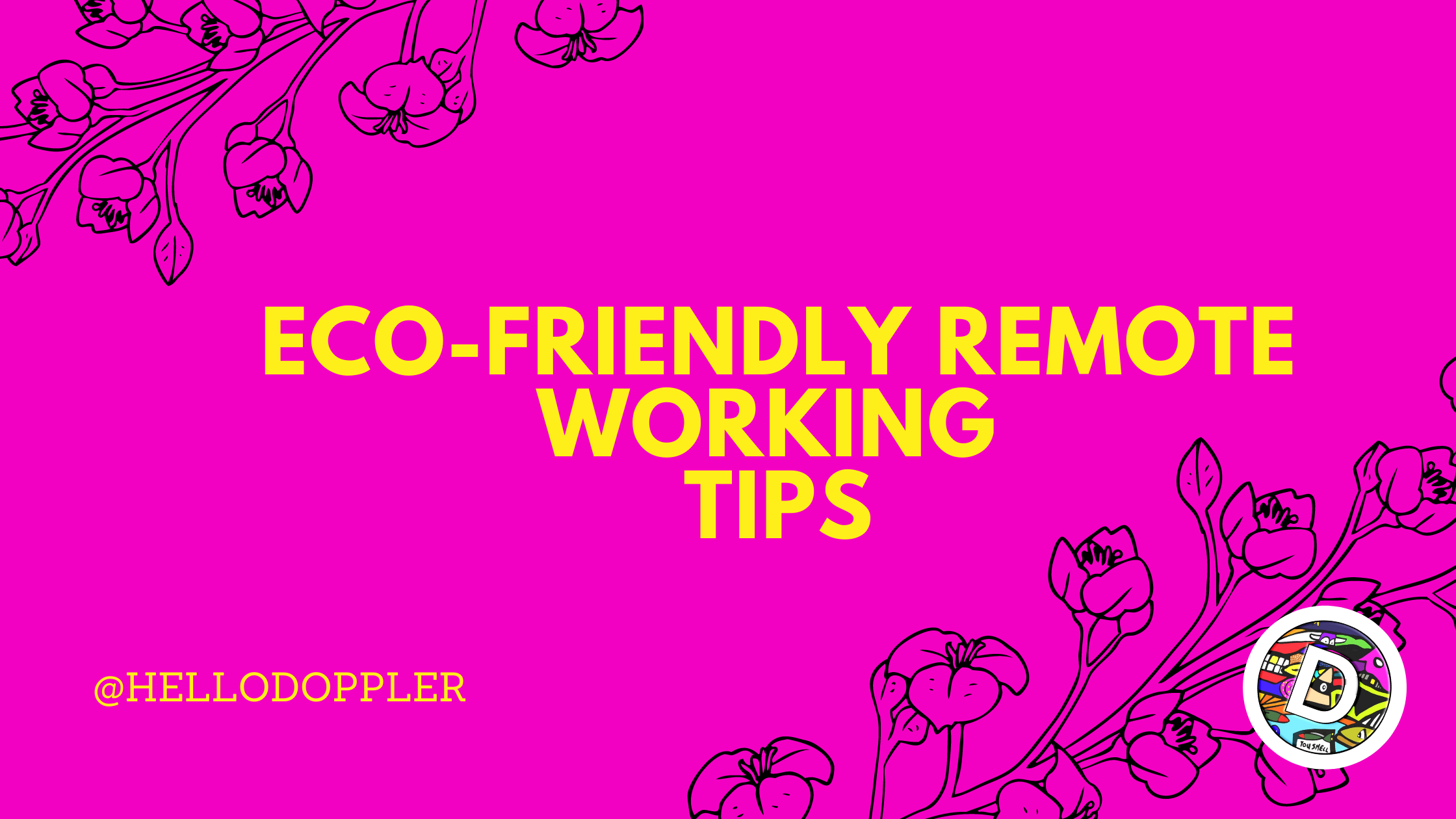How to be eco-friendly when working remotely
Over the last 18 months, many of us have had to adjust and switch up our place of work. With more of us than ever now working remotely and the climate crisis regularly making the headlines, have you found yourself wondering how to ensure that you're making the best eco decisions whilst working from home? Then you're in luck! Read on for some handy hints and tips to help you be eco-friendly whilst working remotely.
Did you know that Doppler has an entirely virtual team spread across the UK? We always had ambitions of being an environmentally savvy company, but as we're going through the process to attain B Corp status, it's not just a nice to have but actually something that we must do. We try our best to be as transparent as possible about our actions and practices here at Doppler Effect, sharing the tips and tricks that we learn along the way.
Utilise natural light
When choosing where you'll work most often, if possible, opt for a room or space with plenty of natural light. This will help you reduce your energy usage and cut down on that electricity bill!
Working with iffy natural light? You can strategically use mirrors to bounce light around. Or use LED bulbs that mimic sunlight; not only will this give you the effect of natural light, but LED bulbs are more energy-efficient than regular fluorescent bulbs.
As well as cutting down on electricity, making the most of natural light has many health benefits such as boosting your immune system and mood.
Choose sustainable materials
If you're renovating your workspace or creating a home office from scratch, then did you know there are now lots of sustainable and natural materials that your builders and contractors could choose? If they're unable to work with renewable materials such as cork, bamboo, or reclaimed wood, then ensure that you know where the materials they are using are coming from and if they're locally sourced.
There are so many eco-friendly and recyclable materials available now that there should be plenty of options out there.
In addition, when decorating your office, opt for low or zero-VOC paints. Volatile Organic Compounds are harmful to our health as well as the environment. There are more VOC-free options than ever when it comes to painting, and the results are just as impressive.
It doesn't stop with the building materials though, furnish your new office with pre-owned and pre-loved pieces from online marketplaces like Facebook Marketplace, Preloved and Freecycle. Not only will you be getting a bargain by buying many items second hand, but you'll be saving perfectly fine pieces of furniture from landfill! Understandably, you may want a new ergonomic chair to sit on, but any cabinets, desks and storage could be second hand.
Think efficiently
How often do you consider how efficient the equipment you use is? From your computer to your printer, look for office equipment that is energy efficient. Consider the practicality of your device, too; a laptop is more portable and efficient than a desktop computer, but do you need the power of a desktop computer for your work? What you do will factor in here.
Whenever you're not using equipment, turn it off. And make sure everything, including any lights, are switched off at the end of the day. You can even unplug anything that you don't use that often to ensure that they're not draining energy whilst not being used.
Do you really need to print that?
Printing is unavoidable, especially when you work with a lot of documents. But before you print anything, ask yourself if the page you're printing is essential.
If the answer is yes, use recycled paper, use both sides of the paper and opt for an environmentally friendly printer that utilises refillable ink cartridges.
Reduce, Reuse, Recycle
So, we've already talked about reusing and recycling furniture for your office, but you can also take this approach to your stationery supplies. From folders and pens to rubber bands or promotional notepads, don't throw away items that you can use.
Make sure to keep track of your stationery levels, so you don't end up doubling up and buying items that you don't need.
When it's time to get rid of things you have no use for, make sure to properly recycle anything you can, and donate or sell furniture to extend its lifespan.
If you want to recycle electrical items, make sure that you're doing so in the right way, because otherwise, it will end up in landfill regardless. However, many local recycling centres have special facilities for recycling e-waste. Alternatively, e-waste recycling companies like Green IT Disposal offer a collection service across the UK for recycling old electrical equipment.
Consider how eco-friendly your suppliers are
To ensure that your home office is as eco-friendly as it can be, consider how eco-conscious any of your suppliers or partners are. When ordering supplies, do some research and see whether or not you have similar ethics and environmental goals. If it's not clear how much they care about our planet, get in contact with them and ask. If they're not very environmentally friendly, then you might be able to get them to reconsider their impact.
These six tips are just some of the ways that you can reduce and limit your environmental impact whilst working from home or remotely. There are so many more ways to make your home office much more sustainable!
Here at Doppler, we're all about doing good. And we do this by supporting social enterprises, B Corporations, and artists of all kinds to reach their dreams. This might be through sharing information about fundraising, supporting marketing strategy or business coaching. Want to know more or work with Doppler? Book your free consultation here.

